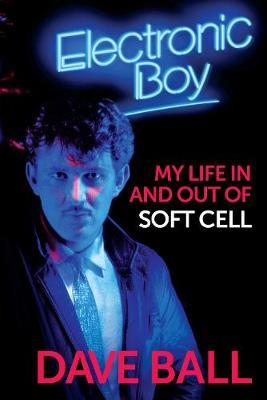
DAVE BALL – Electronic Boy: My Life in and out of Soft Cell
- by J.N.
- Posted on 26-06-2020
Label:
Omnibuss Press
Rating:
5 / 6
Soft Cell synthesizer wizard Dave Ball published this inspired and hugely entertaining autobiography just a couple of weeks ago via the ever-reliable Omnibus Press and what we have here is essentially a well-balanced and insightful memoir that is both revealing and revelatory but never dull. Most people probably associate Ball with early Soft Cell hits ala “Tainted Love”, Say Hello Wave Goodbye”, “Bedsitter”, and “Torch”, but the highly creative musician has collaborated with numerous bands and artists over the years and there is no better place to gain an understanding of (and perspective on) the man’s great body of work than this 312-page exploration of his life both in and out of the artist spotlight.
Dave has a knack for storytelling and a marvelous ability to evoke a sense of atmosphere when reminiscing about his early years and upbringing in Blackpool, the days spent at Leeds Polytechnic studying art, his first encounter with Soft Cell bandmate Marc Almond, the grueling tours and gigs, the recording sessions, the drinks, the women, the drugs, and the late nights in London and New York. There is a palpable sense of warmth and humor to the affair but he is also candid when it comes to his failed marriages, the drug abuse, the creative lows, and the songs and albums that disappeared without a trace. This goes back to what I stated earlier on about the book being well-balanced in the sense that nothing is glossed over, overlooked, or neglected; Ball tells it like it is – warts and all. Strangely, some of his so-called “wilderness years” where he dabbled in projects, studio work, and songwriting sessions that oftentimes proved fruitless or simply stifling rather than stimulating are some of the best and most memorable parts of Ball’s chronicle as they range from hilarious to surreal and further on to downright sad. In other words, there is absolutely no shortage of funny or intriguing anecdotes present here. My only real complaint is that certain chapters on his work in the 21st century feel slightly rushed compared to others.
The early days of the British electro scene and the whole milieu surrounding the bands and outfits relating to synthpop and new wave (and to a lesser extent dark synth minimalism and the New Romantics movement) are covered and discussed too, which is incredibly exciting to read about as Ball paints a vivid and vibrant portrait of said musical phenomenon. After all, he was there and played a massive part in it himself. Another very cool thing that is worth mentioning is that Dave briefly touches on the underrated ambient/experimental record entitled “Photosynthesis” that he did with Jon Savage, which is riddled with dark sounds and dystopian textures – definitely one that is worth checking out.
“Electronic Boy” is a delightfully charming and refreshingly honest piece of literature that is as enlightening as it is witty. Do me a favor and add this to your summer reading list – it will bring a smile to your face.
